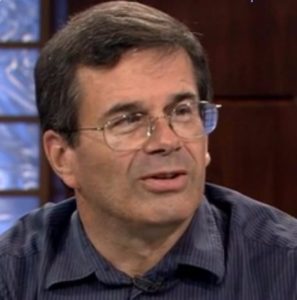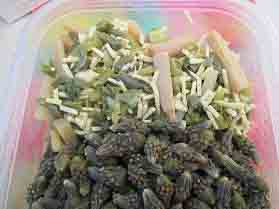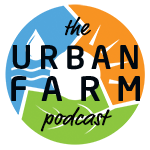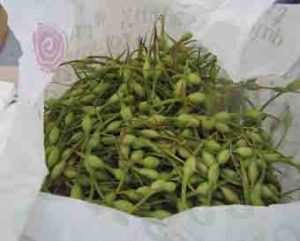306: Mark Lewis on Wildcrafting, Foraging, and Growing Native.
Harvesting sustainable and nourishing foods found growing in the wild.
 Mark is a Wildcrafter extraordinaire. Wildcraft harvesting provides ¾ of his family’s food supply on a daily basis. Additionally he demonstrates sustainable foraging of 200 indigenous plants and 50 mushrooms at Phoenix area farmers markets, universities, schools, and regional conferences.
Mark is a Wildcrafter extraordinaire. Wildcraft harvesting provides ¾ of his family’s food supply on a daily basis. Additionally he demonstrates sustainable foraging of 200 indigenous plants and 50 mushrooms at Phoenix area farmers markets, universities, schools, and regional conferences.
Mark is now embarking on a new endeavor The Farm – growing 100 of the plants that he wildcrafts, introducing them and their culinary potential to area chefs, and sharing them and a library of First Nations’ language ethnobotanical materials with the native American Communities.Don’t miss an episode! Click here to sign up for weekly podcast updates
In This Podcast:
Taking the skills handed down for generations, Mark Lewis is very comfortable eating foods he finds in the wild. He teaches about these foods and their history to the next generation as well as to the people he meets while working at local farmers markets. He is also starting a private farm hoping to save and expand on some of the wild plants that were once a primary source of food for local cultures.
Listen in and learn about:
- His family history of wildcrafting passed down for several generations
- More about the terms wildcrafting and foraging
- How to get started with foraging in this day of technology
- What can be harvested in the fall – mushrooms, acacia, amaranth, cacti, corn, grasses, pinons, and much more
- Why some of these plants are superfoods, and how wild growing plants are creating better tasting fruits

- Vitamin Bombs!
- How the USDA was able to protect some crops from wild crops in the desert
- Goji and Wolfberries – a diversity beyond other countries with fruit ripening January through November
- A wild bush related to jujubes that looks dead, but grows crazy wild
- A grass that grows in soil that is high with salinity
- The Farm in Phoenix that he is using to grow wild plants and teach about these varieties
- Educating people to try new foods and wildcrafting
- How some wild species show evidence of human cultivation
- Encouraging people to not be so scared of trying new things
As well as:
- His failure – a daily thing for him, but he does not let them stop him
- His success – watching his young relatives grow up and become mentors for the next generation
- His drive – Memory – his grandpa taught him and he is using that teaching
- His advice – Don’t waste a Miracle!
Mark’s Book recommendations:

Ceremony by Leslie Marmon Silko
How to reach Mark:
Email: manujib@yahoo.com
UrbanFarm.org/ForagersClub
Producer’s Note: Check out Mark’s blog article on Wildcrafting, Foraging, and Growing Native.
Mark has a couple business besides the Farm he mentions in this podcast. His two businesses are: Chmachyakyakya kurikuri: 8000-year Crops — Ancient-Future Foods Remembered, and
Cactus Calls the Rain: The Foragers’ Club.
Don’t miss an episode! Click here to sign up for weekly podcast updates








Loved the podcast I just listened to with Gregg Peterson from Urban Farming. I am a new agriculture teacher in Alabama and listened to this podcast on my way to a Greenhouse training class. We have about 3 acres at our high school which includes two large greenhouses. The area has been neglected for ten years or so and last year I spent most of the time with inventory, clean up and curriculum, planning. This year I really want to plan in activities that support the appreciation of our unique native plants and environments (wetland areas being a big concern for me). I have spent the spring and summer “foraging” wetland plants and seeing what survives in the greenhouse and feel it would be great to get the kids involved in this. Also very interested in growing from local seeds and rare seeds from other areas. Can I hit you with a few questions?
1. Have you seen any high schools doing this with success?
2.Do you have contacts that might could help me with ideas, grants or free resources (seeds being a huge need).
3. Would you be interested in facetiming with my kids one day?
Kindly,
Betsy Anderton